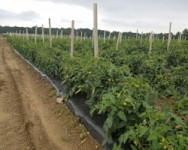Event Details
Date
August 6, 2019
Time
Tues, 5:45 - 8:00pm
Location
Freatman Farms
3699 N Ridge Rd
Lockport, NY 14094
Cost
This event is free.
Host
Cornell Vegetable ProgramElizabeth Buck
585-406-3419
email Elizabeth Buck
Niagara Region Summer Vegetable Meeting
August 6, 2019
Join the CCE Cornell Vegetable Program for an evening covering pest management options plus a crop walk to learn scouting techniques.
It's FREE!
2.0 DEC recertification credits available (categories 10, 1a, 23).
AGENDA:
5:45 PM Arrive, DEC credit sign-up, head to field
6:00 PM Optimizing sweet corn worm and spidermite control programs
Elizabeth Buck, Cornell Vegetable Program
A sweet corn pheromone trap is kept in Ransomville, Niagara County and monitors insect pest pressure. This talk will share the latest trap counts and pest trends, review grower spray programs and success to date managing worms, go over updated GE-resistant varietal recommendations, and practice scouting techniques. Spidermite management will focus on adjusting the overall spray program to avoid inflaming background level spidermite populations and control tactics.
6:30 PM Crop walk of tomato and pumpkin fields
Cornell Vegetable Program staff
While walking the fields, staff will use real-world examples of crop disease, pest, and weed infestations to spur discussion on management of tomato and pepper production challenges. An emphasis will be placed on learning solid identification and scouting techniques. Cultural controls and spray programs will be covered.
7:00 PM Pepper Weevil & other pepper problems
Elizabeth Buck, Cornell Vegetable Program
Pepper weevil is a very difficult to control pest that is endemic in the southern US. Recently there have been persistent annual outbreaks of pepper weevil in greenhouses and fields in Ontario, Canada. Given the proximity to the border, and the large volume of peppers entering the US and marketed in the Niagara region during the pre-harvest stage of local pepper production, growers need to be aware of this potential pest and be able to make early identification of damage. Other pepper issues arising during the field walk will be addressed.
7:15 PM Management options for potato pests
Margie Lund, Cornell Vegetable Program
Colorado Potato Beetle is a persistent and difficult to control pest. Recent research investigating insecticide rotations and novel use patterns, in combination with cultural practices, offers growers with an expanded suite of control tactics. Attendees will practice potato field scouting and discuss management of pests present in the field.
7:45 PM Rhizoctonia and wire-stem of cole crops
Elizabeth Buck, Cornell Vegetable Program
Several area growers lost transplant stage cole crops this spring due to damping off caused by a complex of rhizoctonia and alternaria. Rhizoctonia infections progressed to wirestem in the field. This talk will review the disease life-cycle, sanitation practices for transplant production, and seed treatment options.
8:00 PM Wrap up and DEC credit pick-up
Attendees seeking DEC credit will be required to provide their DEC Certified Pesticide Applicator ID and/or registration number. Only the attendees who remain for the entire course will be awarded a certificate.
Questions? Contact Elizabeth Buck.
Summer Vegetable Meeting Agenda (PDF; 149KB)



































